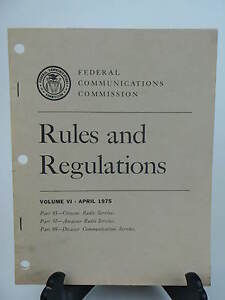
The world of radio and television broadcasting is regulated by the Federal Communications Commission (FCC) in the United States. These regulatory measures are in place to ensure efficient and fair use of the electromagnetic spectrum, prevent interference, and maintain broadcasting standards. For radio and TV licensees, being well-versed in FCC rules is not just a matter of legal compliance; it is a fundamental aspect of responsible broadcasting. In this article, we will explore the reasons why radio and TV licensees must be familiar with FCC rules and the importance of adhering to these regulations.
- Navigating the Regulatory Landscape
The FCC plays a crucial role in overseeing the broadcasting industry and ensuring that all licensees operate within the established guidelines. The regulatory landscape can be complex, with various rules and requirements that licensees must adhere to. Being familiar with FCC rules helps licensees navigate this landscape with confidence, ensuring they operate legally and ethically.
- Ensuring Compliance and Avoiding Penalties
Compliance with FCC rules is not optional; it is a legal obligation for radio and TV licensees. Failure to comply can result in severe penalties, including monetary fines, sanctions, or even the revocation of broadcasting licenses. By understanding the rules, licensees can avoid inadvertent violations and safeguard their broadcasting privileges.
- Protecting Broadcast Integrity
The FCC rules are designed to promote fair and transparent broadcasting practices. They prevent signal interference, protect against piracy and unauthorized transmissions, and ensure that the public airwaves are used responsibly. By complying with these rules, radio and TV licensees contribute to the overall integrity of the broadcasting industry.
- Frequency Management and Spectrum Efficiency
Effective spectrum management is a vital aspect of the FCC’s responsibilities. Radio and TV stations are assigned specific frequencies to avoid interference with one another. Familiarity with FCC rules enables licensees to manage their frequencies effectively, reducing the risk of signal conflicts and ensuring clear and uninterrupted broadcasts.
- Public Safety and Emergency Preparedness
FCC rules often include provisions related to public safety and emergency broadcasting. Radio and TV stations are expected to be prepared to provide critical information to the public during emergencies or natural disasters. Understanding these rules allows licensees to fulfill their role as a reliable source of vital information during times of need.
- Staying Informed about Regulatory Changes
The FCC regularly updates its rules and regulations to adapt to changes in technology and industry trends. Being familiar with these changes helps radio and TV licensees stay informed and adjust their operations accordingly. This proactive approach ensures that their broadcasts remain compliant with the latest FCC requirements.
- Building Trust with the Audience
Radio and TV stations are a trusted source of news, entertainment, and information for their audience. By complying with FCC rules, licensees demonstrate their commitment to professionalism, accountability, and community service. This fosters trust among listeners and viewers, strengthening the relationship between the station and its audience.
Conclusion
For radio and TV licensees, being familiar with FCC rules is not just a legal obligation; it is a crucial aspect of responsible broadcasting. Compliance with these rules ensures that broadcasting operations are conducted ethically, efficiently, and with public interest in mind. By adhering to FCC regulations, radio and TV licensees contribute to a vibrant and trustworthy media landscape, where the public can rely on their broadcasts for accurate information and entertainment. Ultimately, staying on air and serving their audience effectively hinges on a thorough understanding of FCC rules and a commitment to maintaining broadcasting standards.
